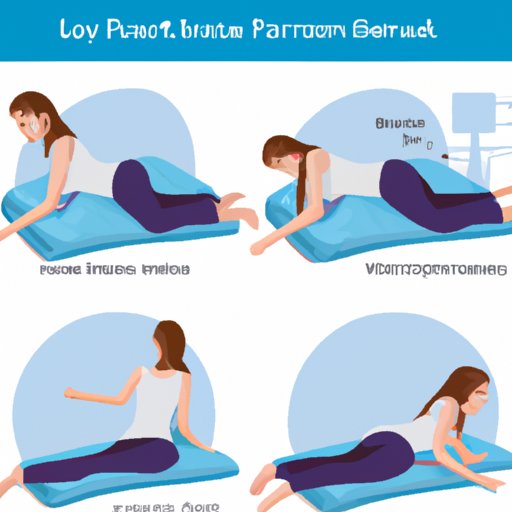I. Introduction
Lower back pain is a common issue that affects people of all ages and lifestyles. When it comes to sleep, back pain can make it difficult to find a comfortable position and could cause difficulty in getting quality rest. Lack of sleep, in turn, can make the pain worse, creating a vicious cycle. This article will explore ways to alleviate lower back pain to achieve better sleep and ultimately, a better quality of life.
II. Tips for Optimal Sleeping Posture
Sleeping in the right posture is crucial for those with lower back pain. The most popular sleeping positions are on the back, stomach, or side. However, each has its pros and cons. Back sleepers, for instance, benefit from keeping their head and knees elevated slightly, while stomach sleepers can find relief by placing a pillow under the pelvis to reduce the pressure on their lower back. Side sleepers should keep their spine aligned by placing a pillow between their knees.
III. Use the Right Pillow
Choosing the right pillow can help maintain good sleep posture and alleviate lower back pain. Memory foam pillows are ideal for those with back pain, with their ability to mold to your head and neck, providing proper support. Water pillows can also provide proper spinal alignment, while feather pillows are considered the softest option available, albeit not conducive for those with back pain.
IV. Exercise and Stretches to Alleviate Lower Back Pain
Exercises and stretches can help reduce tension in the lower back, releasing compressing muscles. Stretching exercises like the pelvic tilt can improve hip mobility, while deep squats can engage and strengthen the muscles in the back. Incorporating physical activity into your daily routine can improve the quality of your sleep, with exercise promoting deeper and restful sleep, thus reducing the likelihood of pains.
V. Bedtime Routines
Establishing a relaxing routine before bedtime can help relieve lower back pain. Massages and heat therapy can reduce tension in muscles while a warm bath can soothe back pain. Other helpful tips include meditation or low-intensity activities that can create a relaxing atmosphere before sleep.
VI. Tips for Choosing the Right Mattress
Choosing the right mattress is critical for people with lower back pain, with the bed providing the primary support for the spine. Factors like firmness or softness, material, and supportiveness should be considered when selecting a mattress. Foam, latex, or hybrid mattresses provide the ideal balance of support and comfort while innerspring mattresses are more suited to those who need extra support as they sleep.
VII. Natural Remedies to Alleviate Lower Back Pain
Natural remedies like essential oils, supplements, and herbal remedies can help alleviate lower back pain. Essential oils can be used for massages or added to bathwater to help calm the mind, whereas supplements like glucosamine or turmeric can prominently reduce inflammation throughout lower back muscles. Herbs like ginger and devil’s claw can provide pain relief. However, you must consult a healthcare professional before using any natural remedies in case of allergies or medication complications.
VIII. Conclusion
The key to enjoying better sleep quality with lower back pain is to find a combination of remedies that work for you. By using the right pillow, incorporating specific exercises into your routine, developing relaxing bedtime routines, and selecting the optimal mattress, you can ideally achieve quality sleep this is essential for alleviating lower back pain and promoting overall health.
By exploring these recommended methods and treatments outlined above, you can rest assured that a better night’s sleep with reduced pain levels is achievable. With dedication and experimentation, you’ll be able to alleviate lower back pain to enjoy regular and quality sleep — and ultimately, a healthier, happier lifestyle.
